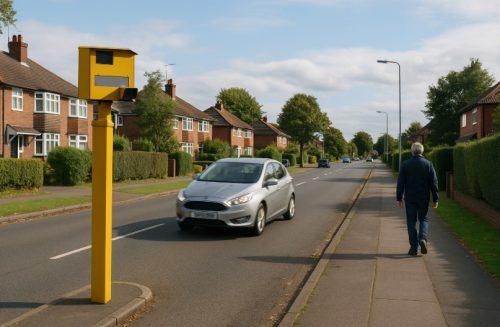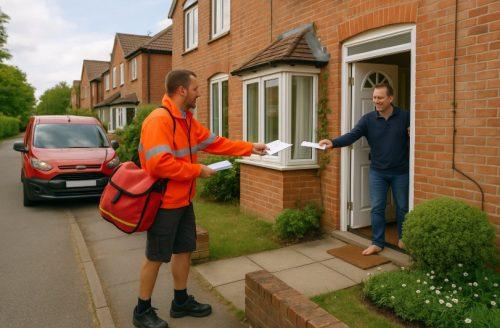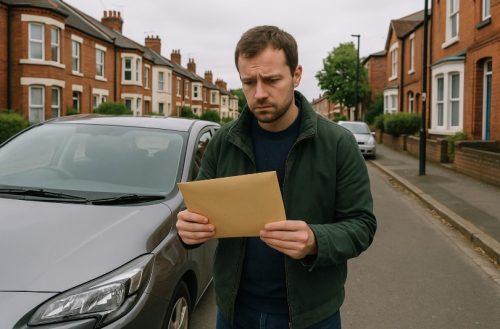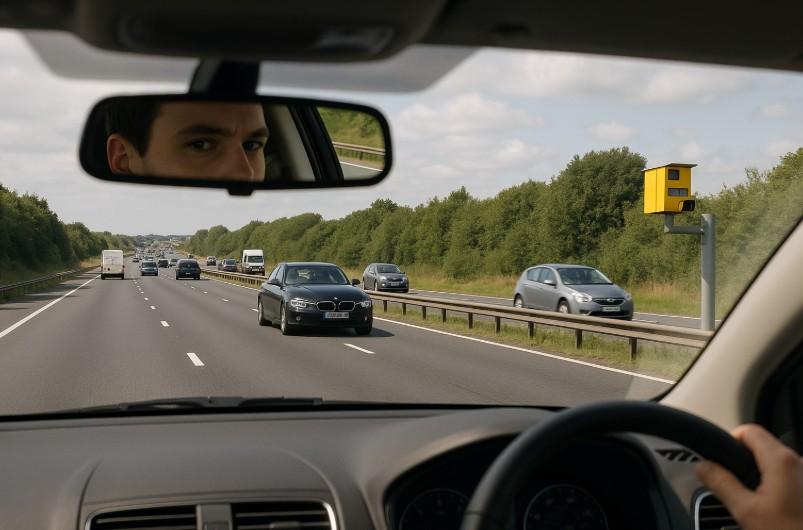If you’ve been flashed by a speed camera or suspect that you may have been caught speeding, one of the first questions that comes to mind is how long it will take for a speeding fine to arrive. The waiting period can feel stressful, especially if you’re worried about how the fine or penalty points might affect your driving record, insurance costs, or even your financial plans.
In the UK, there are clear legal guidelines on when you should be notified of a speeding offence, but there’s also the reality of how quickly these notices tend to arrive in practice.
Understanding both the legal requirements and the common variations can help you prepare mentally and financially while you wait. This guide explains the 14-day rule, the process of receiving a Notice of Intended Prosecution, and the possible delays, so you know what to expect.
What Is the 14-Day Rule for Speeding Fines in the UK?

The 14-day rule is one of the most important legal protections for drivers when it comes to speeding offences. According to Section 1 of the Road Traffic Offenders Act 1988, if you are caught speeding by a camera and are not stopped by the police at the scene, you must be sent a Notice of Intended Prosecution (NIP) within 14 days of the offence.
This means the notice must be received by the registered keeper of the vehicle by the end of the 14th day, with the day of the offence counted as day 0. Posting the notice is not enough, it has to be delivered in time.
Key points to note about the 14-day rule:
- Applies only when the driver is not warned at the scene
- The notice must be served, not just sent
- The rule is based on the date of receipt, not the date of posting
The 14-day rule aims to ensure fairness, allowing you to recall events while they’re still fresh. While it provides a potential defence if breached, there are exceptions where a late NIP can still be valid, which will be covered in later sections. Understanding the rule’s scope is the first step in managing expectations about receiving a speeding fine.
How Does the Notice of Intended Prosecution (NIP) Process Work?
Once a speeding offence is detected, either by a fixed speed camera or a mobile enforcement unit, the police initiate the process by sending out a Notice of Intended Prosecution. This document serves to inform you that you are being considered for prosecution and is often accompanied by a Section 172 notice, which requires you to identify the driver at the time of the offence.
What is the Typical Process?
- Detection of the offence by a speed camera or device
- Processing of vehicle registration details from the DVLA database
- Issuing and posting of the NIP to the registered keeper’s address
- Registered keeper responds to the Section 172 notice within 28 days
It is important to distinguish between the NIP and the fixed penalty notice (FPN). The NIP is the initial notification, while the FPN is issued later if you accept the offence or if your case is straightforward.
If the NIP is not served on the registered keeper within 14 days and no valid exceptions apply, you may have grounds to challenge the speeding allegation.
However, most notices arrive within the expected period, particularly when the vehicle details are up to date. This process is designed to be systematic, ensuring you are notified promptly and given the opportunity to respond within the legal timeframe.
How Quickly Do Speeding Fines Usually Arrive in Practice?

While the law sets a 14-day limit for serving the NIP, in practice many drivers receive it much sooner. In most cases, you can expect the notice to arrive within 5 to 10 days after the offence, although the exact time can vary depending on location, police processing speed, and postal service efficiency.
From shared experiences across motoring forums, many drivers report receiving their NIP in about a week. However, some cases may take longer, especially during busy holiday periods or if there are minor administrative delays.
What Are the Typical Arrival Patterns?
| Delivery Timeframe | Typical Scenario |
|---|---|
| 5–7 days | Common in urban areas with efficient postal service |
| 8–10 days | Often seen in rural areas or during busy seasons |
| 11–14 days | Usually occurs when close to the deadline or with minor delays |
While it’s natural to feel anxious during this period, especially if you’re budgeting for possible fines or adjusting travel plans, the waiting time is usually predictable. By day 15, if no NIP has arrived and you are the registered keeper with correct details, there may be no legal obligation to pay a fine, subject to the exceptions discussed later.
Why Might a Speeding Fine Arrive Late?
Despite the legal requirement, there are several reasons why a speeding fine might arrive later than expected.
These include:
- Incorrect or outdated address on the vehicle logbook
- Recent change in vehicle ownership
- Vehicle leased or hired, requiring extra processing steps
- Postal strikes or severe weather disruptions
- Notices sent close to bank holidays
Late arrivals do not automatically mean the fine is invalid. If the police can prove they acted in time and the delay was beyond their control, the notice can still be enforceable. For example, if they posted it within a timeframe that would reasonably allow it to arrive within 14 days, but postal delays occurred, the fine would likely still stand.
Understanding these factors can help you assess whether a late NIP could be challenged. While frustrating, delays are not always a defence, and in many cases, the notice remains valid despite arriving after the typical timeframe.
Does a Late NIP Make the Speeding Fine Invalid?

A late NIP can make a speeding fine invalid, but only under specific conditions. The crucial factor is whether the police served the notice on the registered keeper within the 14-day window. If they did not, and no exceptions apply, the fine may be unenforceable.
What Are the Exceptions That Can Uphold the Notice?
- Incorrect keeper details provided by DVLA
- NIP sent to a leasing or hire company first
- Postal delays are considered reasonable under the circumstances
The law operates on the principle of reasonable expectation, meaning the notice is considered served if it should have arrived within 14 days under normal conditions.
This legal presumption is difficult to challenge without clear evidence, such as dated postal records or witness statements confirming late delivery. If you believe your NIP was served late without justification, legal advice is recommended before taking further steps.
How Do Manned Speed Cameras and Camera Vans Affect the Timeline?
The method of speed detection can influence when you receive your NIP. Fixed speed cameras, such as those installed on motorways or busy roads, usually result in faster processing because the offence is recorded and logged automatically.
Manned speed cameras and mobile camera vans often involve manual review of footage before an NIP is issued. While this may add a day or two to the process, most notices are still sent within the required 14 days.
In practice:
- Fixed cameras: NIP often arrives within 5–7 days
- Camera vans: NIP typically arrives within 7–10 days
- Handheld police devices: May involve additional checks but still usually meet deadlines
The detection method rarely affects the validity of the notice unless delays push it beyond the 14-day legal limit without valid exceptions.
What Happens After You Return the Section 172 Notice?

Once you return the Section 172 notice confirming the identity of the driver, the police will decide how to proceed. In straightforward cases, you may receive a Fixed Penalty Notice, which includes a fine (often £100) and penalty points on your licence.
In some cases, particularly if you were only slightly over the limit and have no recent offences, you may be offered a speed awareness course instead of penalty points.
If the offence is more serious, you may receive a court summons, where the penalty could be higher and may include a driving ban.
This stage is time-sensitive, so prompt response to the Section 172 notice is essential. Failing to respond can result in a separate offence carrying six penalty points and a substantial fine.
Can You Challenge a Speeding Fine Based on the 14-Day Rule?
Yes, you can challenge a speeding fine if the NIP was served late without a valid reason, but success depends on evidence.
You will need to show that:
- You are the registered keeper
- Your address details were correct and up to date
- The NIP arrived after the 14-day limit
Evidence could include the date stamp on the envelope or sworn statements about the delivery date. Keep in mind that the burden of proof is on you.
Challenges can be risky, especially if the police can prove they sent the notice in time. Before proceeding, legal advice is strongly recommended to avoid losing the opportunity for a speed awareness course or reduced penalty.
How Can You Reduce the Stress of Waiting for a Speeding Fine?

Waiting for a possible speeding fine can be unsettling, especially if it might affect your budget or travel plans.
While you can’t speed up the process, you can manage your stress levels by:
- Setting aside funds in case a fine arrives
- Tracking the days since the alleged offence
- Reviewing your vehicle registration details for accuracy
- Seeking early legal advice if you’re unsure about the outcome
By staying proactive, you can feel more in control during the waiting period. Even if the fine arrives, you’ll be prepared to deal with it quickly and efficiently.
Typical Speeding Fine Timeline in the UK
| Stage | Expected Timeframe | Possible Delays |
| Offence detected | Day 0 | None |
| NIP issued | Within 3–5 days | Admin backlog |
| NIP delivered | Day 5–10 | Postal delays |
| Section 172 returned | Within 28 days | Late posting by driver |
| FPN or course offer issued | Within 1–2 weeks | Case review time |
Conclusion
Receiving a speeding fine in the UK follows a clear legal process, but the experience can feel stressful when you are waiting to see if a Notice of Intended Prosecution will arrive. The 14-day rule offers protection, but it comes with exceptions, meaning that a late arrival does not always invalidate the notice.
In practice, most NIPs arrive within a week to ten days, although postal issues, incorrect addresses, or vehicle ownership changes can extend this period. By understanding the process, keeping your details accurate, and knowing your legal rights, you can manage your expectations and reduce the anxiety of waiting.
If a fine does arrive, acting promptly and considering all your options, including speed awareness courses, can help you minimise the impact. Knowledge of the law and timelines is your best tool for dealing with speeding fines confidently.
FAQs
How many days does it take for a speeding ticket to arrive in the UK?
Most speeding tickets arrive within 5 to 10 days, although the law allows up to 14 days for the Notice of Intended Prosecution to be served on the registered keeper.
Do all speeding offences have to follow the 14-day rule?
No, the 14-day rule applies only when you are not stopped at the time of the offence. If you are stopped and warned in person, the rule does not apply.
How long do police have to prosecute for speeding in the UK?
In most cases, police have up to six months from the date of the offence to begin prosecution, but the initial notice must be served within 14 days if the rule applies.
Can I get points removed if my NIP is late?
If the NIP was served outside the 14-day limit without valid reason, you may be able to challenge the fine and penalty points, but evidence is required.
Does a verbal NIP count under the 14-day rule?
Yes, if you are stopped by police at the time of the offence, a verbal NIP given on the spot fulfils the requirement, so the 14-day limit for a written notice does not apply.
If my car is leased, when will I get my speeding fine?
The initial NIP will go to the leasing company, which will then nominate you as the driver. This means your notice may arrive later than if you owned the vehicle.
Will a postal strike affect my speeding ticket validity?
A postal strike may delay delivery, but as long as the police posted the NIP in time for it to reasonably arrive within 14 days, it is still considered valid.
Recent Posts








